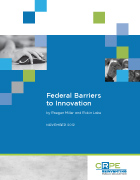While some federal initiatives, such as The Investing in Innovation Fund (i3), have been aimed at promoting innovation in education, some of the fiscal requirements of two large federal education programs–namely Title I and IDEA Part B–stand in the way. This paper identifies three fiscal requirements of these programs that encourage the status quo, instilling in districts a profound deference for existing staffing and spending patterns.
The report recommends a number of reforms to make federal programs more favorable to innovation: closing the Title I comparability loophole, streamlining its supplement-not-supplant requirement, and instituting a “challenge waiver” system for IDEA Part B maintenance of effort. The report also recommends redirecting Title II funds to support programs and initiatives designed to develop effective new instructional technologies and take them to scale. According to the authors, these modifications would break down barriers to innovation as well as promote smarter, fairer uses of taxpayer money to support public education.




